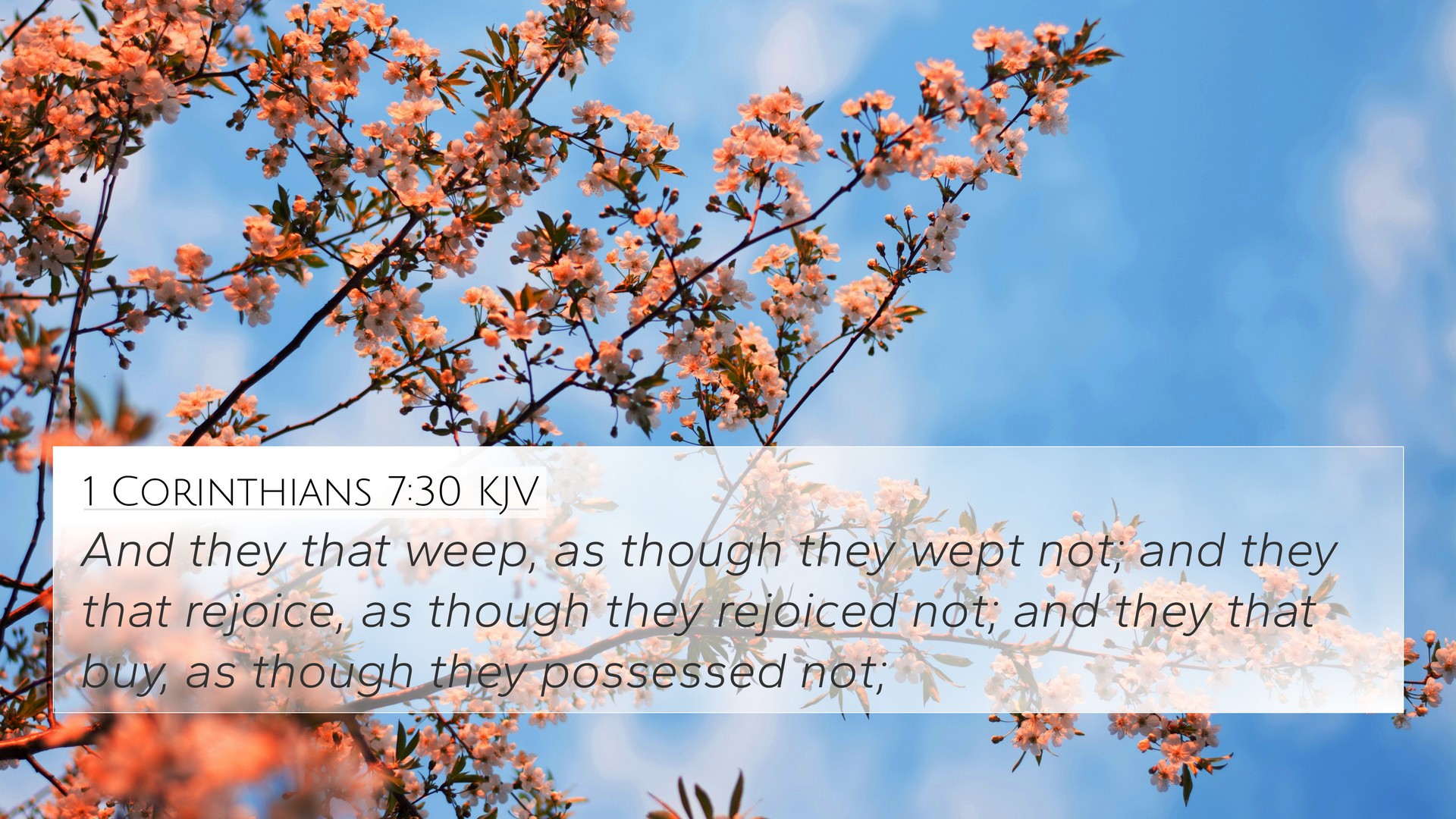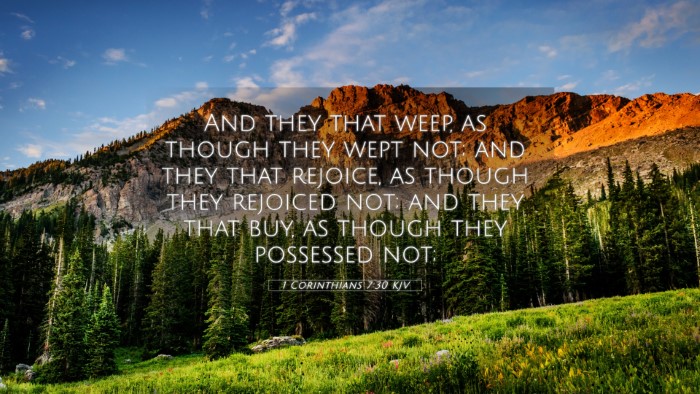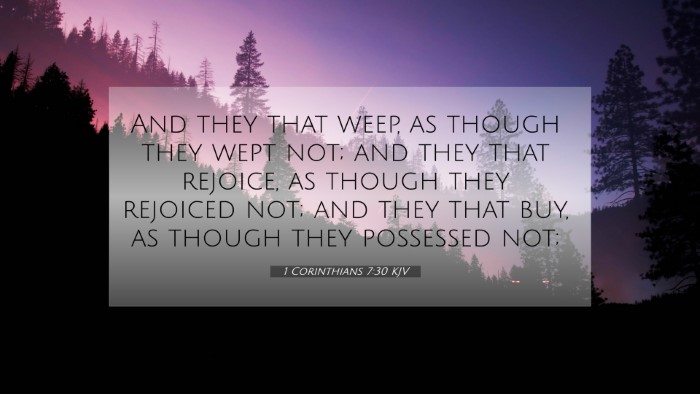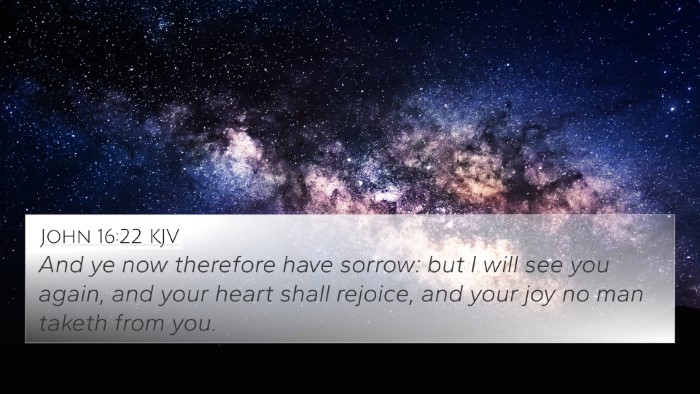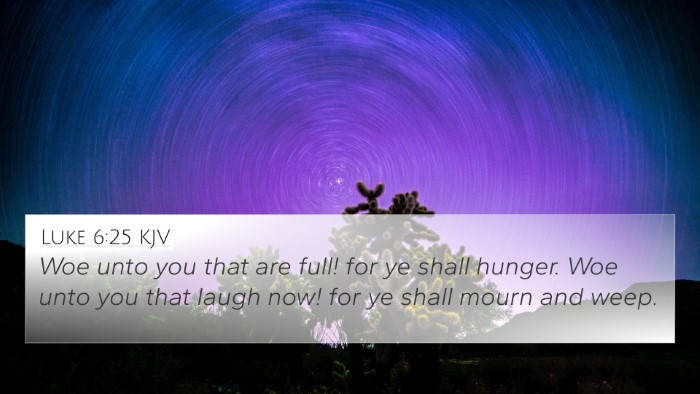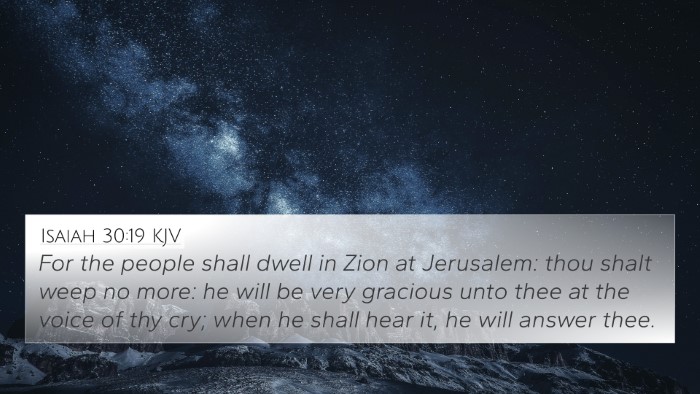Understanding 1 Corinthians 7:30
Verse: "And they that weep, as though they wept not; and they that rejoice, as though they rejoiced not; and they that buy, as though they possessed not." (1 Corinthians 7:30)
This verse from the Apostle Paul encapsulates the theme of emotional detachment in the face of the transient nature of life's circumstances. The Apostle urges believers to maintain a perspective that transcends ordinary experiences of sorrow, joy, and material possession.
Commentary Overview
Insights from renowned public domain commentaries provide a richer understanding of this verse.
Matthew Henry's Commentary
Henry emphasizes the impermanence of earthly experiences. He notes that while Christians experience sorrow and joy, they must hold these feelings lightly, recognizing that they are temporary and do not define one's spiritual state. Our focus should remain on the eternal, rather than being overly consumed by our immediate circumstances.
Albert Barnes' Notes
Barnes expands on the idea of emotional detachment. He interprets Paul’s admonition as guidance for living in a way that prioritizes spiritual health over emotional volatility. Believers should engage in life fully, yet remain aware of its fleeting nature, shouldering the responsibilities without becoming overly attached to them.
Adam Clarke's Commentary
Clarke emphasizes the call to live with a sense of urgency and purpose. He suggests that the Apostle Paul is instructing the Corinthians to not allow their emotional highs and lows to interfere with their spiritual duties. Clarke also reminds readers to balance their worldly responsibilities with their heavenly calling.
Bible Cross-References
This verse connects to various other scriptures that explore similar themes. Here are some related verses for deeper study:
- Romans 12:15: "Rejoice with those who rejoice, and weep with those who weep." - This emphasizes the communal aspect of emotions.
- Philippians 4:4: "Rejoice in the Lord always: and again I say, Rejoice." - This reinforces the focus on joy in Christ.
- James 4:14: "For what is your life? It is even a vapour, that appeareth for a little time, and then vanisheth away." - A reminder of life's brevity.
- 1 Peter 1:24-25: "For all flesh is as grass, and all the glory of man as the flower of grass." - This emphasizes the temporary nature of earthly concerns.
- Colossians 3:2: "Set your affection on things above, not on things on the earth." - Encouragement to focus on eternal realities.
- Matthew 6:19-20: "Lay not up for yourselves treasures upon earth... but lay up for yourselves treasures in heaven." - This teaches to prioritize spiritual riches.
- Ecclesiastes 3:1: "To every thing there is a season, and a time to every purpose under the heaven." - Recognizing the times and seasons of life.
- 2 Corinthians 4:17-18: "For our light affliction, which is but for a moment, worketh for us a far more exceeding and eternal weight of glory." - Perspective on suffering and eternity.
- 2 Timothy 2:4: "No man that warreth entangleth himself with the affairs of this life." - A call to prioritize spiritual commitments.
- Hebrews 12:1-2: "Let us lay aside every weight, and the sin which doth so easily beset us, and let us run with patience the race that is set before us." - This speaks to focusing on the spiritual journey rather than earthly distractions.
Thematic Connections
The connections between these Bible verses reinforce the themes of detachment, the fleeting nature of life, and a focus on eternal spiritual values. Each scripture addresses the necessity of maintaining a mindset that prioritizes relationship with God and the eternal over momentary feelings and material possessions.
Conclusion
In summary, 1 Corinthians 7:30 calls believers to approach life with an understanding of its transient nature. By engaging fully but with an eternal perspective, Christians can navigate their joys, sorrows, and worldly concerns in a way that reflects their faith. The study of cross-references enhances our comprehension and application of these principles, offering a greater depth of insight into how we are to live as followers of Christ.
Cross-Referencing Tools and Study Methods
For those looking to deepen their understanding of scripture, utilizing tools for cross-referencing can be particularly beneficial. Bible concordances, cross-reference guides, and various Bible study resources can facilitate a richer exploration of biblical themes and connections:
- Bible Concordance: Helps locate specific verses and their themes.
- Cross-Reference Bible Study: Engages the reader in finding connections through thematic studies.
- Bible Reference Resources: Provides foundational support for studying inter-linked scriptures.
- Cross-Referencing Bible Study Methods: Offers structured approaches to uncover deeper truths.
- How to Use Bible Cross-References: Guides beginners in exploring the interconnectedness of scripture.
